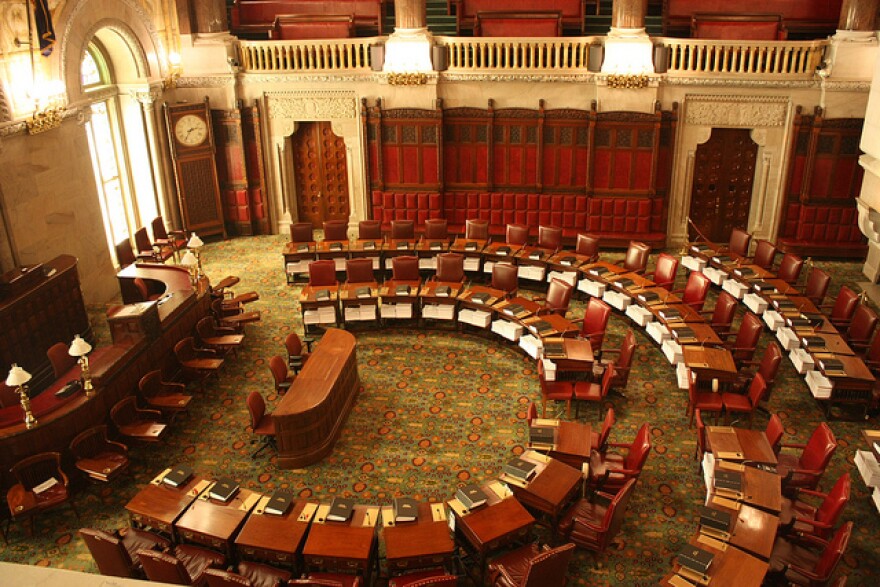New York state could require nursing homes to spend a certain amount of their revenue on direct patient care, mandate transparent reporting of COVID-19 deaths of residents at those facilities, and more under a package of bills passed by the State Senate Monday.
The legislation is the result of a pair of public hearings on the state’s handling of COVID-19 in nursing homes last summer, coupled with new revelations about the Cuomo administration.
Democrats, who control both chambers of the state Legislature, had already teed up the package of bills for passage a few weeks ago, but new information about the state’s decisions related to nursing homes has fueled that fire in recent days.
“The tragic situation in our nursing homes remains a heartbreaking reminder of the toll this pandemic has taken and has made it clear that real reforms are needed,” said Senate Majority Leader Andrea Stewart-Cousins, D-Westchester.
Democrats in the State Assembly also plan to approve a package of bills on nursing homes, but Assembly Speaker Carl Heastie, D-Bronx, said Monday that it may not be identical to what was approved by the Senate.
The Senate’s package of 11 bills is aimed at strengthening the state’s oversight of nursing homes, while setting new standards of care for those facilities.
One bill, for example, would direct the state Department of Health to create a new infection control inspection audit and checklist for nursing homes, while another would require those facilities to create committees to monitor the quality of care.
Other parts of the package would be aimed at independent oversight of nursing homes, and changes to visitation.
The Long-Term Care Ombudsman Program Reform Act would expand the current nursing home ombudsman program and improve the level of interaction between the program and the state Department of Health.
The ombudsman program is made up of volunteers who visit nursing homes and work with residents to monitor their quality of care and assess if facilities are meeting their needs.
Another bill would create a program that would allow certain visitors to take on a more formal role in compassionate or personal care of residents. The change would allow those individuals to visit nursing homes residents, even if there’s a ban on outside visitors from the state.
That legislation is also intended as a supplement for situations in which nursing home staff may be stretched too thin to provide close care to residents.
But another piece of legislation from the package also intends to address staffing at nursing homes, some of which were accused by the state Attorney General’s Office last month of having dangerously high staff to patient ratios.
That bill would require nursing homes to spend at least 70% of their revenue on direct patient care, with a requirement that 40% be spent on staff wages and benefits. That measure is sponsored by Sen. Gustavo Rivera, D-Bronx, who chairs the Senate Health Committee.
“This pandemic has made it clear that New York's models of oversight and accountability for nursing homes need to be reformed,” Rivera said.
“These bills are necessary to build confidence, increase transparency, and provide appropriate aid to improve the quality of care and safety of both residents and staff."
A few of the remaining bills approved by the Senate Monday would mandate stronger transparency of operations at nursing homes, which have been in the spotlight over the past year as a hotbed for the coronavirus.
One bill would require the federal quality ratings for nursing homes to be published by the state and on each facility’s website. Another would create requirements for the transfer or discharge of residents.
Another is targeted directly at the Cuomo administration and would require the state Department of Health to report COVID-19 deaths of nursing home residents that die in hospitals.
Until a few weeks ago, New York had only reported the number of nursing home residents who died within those facilities. Nursing home residents who died after being transferred to the hospital were, instead, lumped in with the rest of the state’s deaths.
After a report released from the Attorney General’s Office accused the administration of undercounting nursing home deaths by excluding hospital deaths from the official count, the state started releasing a detailed breakdown of those fatalities.
Data released by the state in recent weeks has shown that more than 4,000 nursing home residents died after being transferred to a hospital or other facility. The total number of long-term care residents who’ve died from COVID-19 now exceeds 15,000 in New York.
That’s compared to the same time last month, when the state had only publicly reported about 8,700 nursing home deaths.
The largest union of nurses in New York state, meanwhile, called on lawmakers Monday to pass legislation that would mandate specific staffing levels at health care facilities, including nursing homes, saying a lack of personnel affected patient care during the pandemic.
The New York State Nurses Association has been calling on the Legislature to mandate higher staffing levels for years, but said Monday that COVID-19 confirmed their past warnings.
“Doesn’t matter if it’s the ICU or emergency department or other units, the COVID pandemic has made our inadequate staffing even worse in units throughout the hospital,” said Tracy Kosciuk, a registered nurse at St. Charles Hospital in Suffolk County.
That legislation, called the Safe Staffing for Quality Care Act, hasn’t gained enough support to pass the Legislature at this point.




